Please introduce yourself and your book(s)
My name is Verena Key. I live and work in a small German village, with a river nearby, and remnants of a medieval fortress on the hill, surrounded by vineyards and a forest… In other words, I don’t have to walk too far in search of inspiration. I have published two romance books so far, available on Amazon: “Forest Magic” and “The Neighbor”. “Forest Magic” is a story of second chances, taking place in a village somewhere in the Black Forest. “The Neighbor” is an age gap romance loosely inspired by “Jane Eyre”.
Tell us about the characters and relationships in your stories
The characters in my books are real people who struggle with real problems. Often the tragedies and secrets from their pasts prevent them from being happy. They have to face and overcome many obstacles before becoming capable of finding, and keeping, love.
In “Forest Magic” we encounter two people who have made terrible choices in life and believe that makes them unworthy of love. They come to a small village in the middle of a beautiful forest to hide from themselves and their past, and to search for forgiveness. What they find is each other.
In “The Neighbor”, in addition to a significant age difference between the protagonists, there is a strong disparity in experience and social status – similar to what we encounter in “Jane Eyre”. I tried to imagine what such a relationship would look like in the modern age. What would entice an older man to fall in love with someone much younger and vulnerable and what kind of love would that be? How would he be able to justify it and could love between partners so unequal in practically everything last at all, or would it inevitably turn into slavery? I wanted my characters to navigate through all these issues – to experience doubt, self-reproach, to question their own morality, to be faced with temptations, and see if they are strong enough to make the right choices.
What lessons could readers learn about real-world relationships from your novel(s)?
One of the lessons from “Forest Magic” would be that in order to love someone else, we first need to love ourselves. We should not become imprisoned by the fear of repeating our mistakes, but find the courage to live and love, even if it means that we might get hurt again.
I think that the central message in “The Neighbor” is that love and possession are not one and the same thing, but that the boundary between the two can become blurred when partners are not equal. Loving someone means supporting them and helping them to become the best version of themselves – eventually, perhaps, even letting them go. Another important message I tried to communicate with this book is that our happiness should not completely depend on another person. We cannot expect other people to save us – we have to do most of the work ourselves, no matter how difficult that sometimes is.
What real-life relationship experiences, observations or insights have influenced your writing?
Some of my personal experiences have certainly contributed to the way I perceive things and react to them, and consequently, to the way I write about them in my books. The importance of the equality of the partners, which is the central motive of “The Neighbor”, is certainly something one often encounters in real life. With that, I mean that not only financial but also emotional independence should exist for the people to be able to fully develop their potential within a relationship.
Are there any relationship themes or topics you want to cover in future releases?
Of course – the world is full of love stories that are waiting to be told. For example, I have recently finished a romantic comedy about a cave explorer and a movie star, which talks about a relationship where trust is a major issue. I also plan to write a series of books about characters who come from different social circles but learn to respect and love each other. So, I hope to be able to share many more stories with my readers. And as I do not thrive on tragedy, my protagonists usually manage to learn and grow enough to deserve a happy ending.

